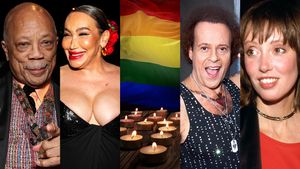If one more person tells me that "all gender is performance" I think I am going to strangle them. What's most annoying about that sound-bite is how it is often recited in a somewhat snooty "I-took-a-gender-studies-class-and-you-didn't" sort of way, which is ironic given the way that phrase dumbs down gender. It is a crass oversimplification that is as ridiculous as saying all gender is genitals, all gender is chromosomes, or all gender is socialization. In reality, gender is all of these things and more. In fact, if there's one thing that all of us should be able to agree on, it's that gender is a confusing and complicated mess. It's like a junior high school mixer, where our bodies and our internal desires awkwardly dance with one another and with the external expectations that other people place on us.
Sure, I can perform gender: I can curtsy, or throw like a girl, or bat my eyelashes. But performance doesn't explain why certain behaviors and ways of being come to me more naturally than others. It offers no insight into the countless restless nights I spent as a pre-teen wrestling with the inexplicable feeling that I should be female. It doesn't capture the very real physical and emotional changes that I experienced when I hormonally transitioned from testosterone to estrogen. Performance doesn't even begin to address the fact that, during my transition, I acted the same -- wore the same t-shirts, jeans and sneakers that I always had -- yet once other people started reading me as female, they began treating me very differently. When we talk about my gender as though it were a performance, we let the audience -- with all of their expectations, prejudices and presumptions -- completely off the hook.
Look, I know that many contemporary queer folks and feminists embrace mantras like "all gender is performance," "all gender is drag," and "gender is just a construct." They seem empowered by the way these sayings give the impression that gender is merely a fiction. A facade. A figment of our imaginations. And of course, this is a convenient strategy, provided that you're not a trans woman who lacks the means to change her legal sex to female, and who thus runs the very real risk of being locked up in an all-male jail cell. Provided that you're not a trans man who has to navigate the discrepancy between his male identity and female history during job interviews and first dates. Whenever I hear someone who has not had a transsexual experience say that gender is just a construct or merely a performance, it always reminds me of that Stephen Colbert gag where he insists that he doesn't see race. It's easy to fictionalize an issue when you are not fully in touch with all of the ways in which you are privileged by it.
Almost every day of my life I deal with people who insist on seeing my femaleness as fake. People who make a point of calling me effeminate rather than feminine. People who slip up my pronouns, but only after they find out that I'm trans, never beforehand. People who insist on third-sexing me with labels like MTF, boy-girl, he-she, she-male, ze, hir, it -- anything but simply female. Because I'm transsexual, I am sometimes accused of impersonation or deception when I am simply being myself. So it seems to me that this strategy of fictionalizing gender will only ever serve to marginalize me further.
So I ask you: Can't we find new ways of speaking? Shouldn't we be championing new slogans that empower all of us, whether trans or non-trans, queer or straight, female and/or male and/or none of the above?
Instead of saying that all gender is this or all gender is that, let's recognize that the word gender has scores of meanings built into it. It's an amalgamation of bodies, identities and life experiences, of subconscious urges, sensations and behaviors, some of which develop organically, and others which are shaped by language and culture. Instead of saying that gender is any one single thing, let's start describing it as a holistic experience.
Instead of saying that all gender is performance, let's admit that sometimes gender is an act, and other times it isn't. And since we can't get inside of one another's minds, we have no way of knowing whether any given person's gender is sincere or contrived. Let's fess up to the fact that when we make judgments about other people's genders, we're typically basing it on our own assumptions (and we all know what happens when you assume, right?).
Let's stop claiming that certain genders and sexualities "reinforce the gender binary." In the past, that tactic has been used to dismiss butches and femmes, bisexuals, trans folks and our partners, and feminine people of every persuasion. Gender isn't simply some faucet that we can turn on and off in order to appease other people, whether they be heterosexist bigots or queerer-than-thou hipsters. How about this: let's stop pretending that we have all the answers, because when it comes to gender, none of us is fucking omniscient.
Instead of trying to fictionalize gender, let's talk about all of the moments in life when gender feels all too real. Because gender doesn't feel like drag when you're a young trans child begging your parents not to cut your hair or not to force you to wear that dress. And gender doesn't feel like a performance when, for the first time in your life, you feel safe and empowered enough to express yourself in ways that resonate with you, rather than remaining closeted for the benefit of others. And gender doesn't feel like a construct when you finally find that special person whose body, personality, identity and energy feels like a perfect fit with yours. Let's stop trying to deconstruct gender into non-existence and instead start celebrating it as inexplicable, varied, profound and intricate.
So don't dare dismiss my gender as a construct, drag or a performance, because my gender is a work of non-fiction.
***
Julia Serano is an Oakland, Calif.-based writer, performer, and activist. She is the author of Whipping Girl: A Transsexual Woman on Sexism and the Scapegoating of Femininity (Seal Press, 2007), a collection of personal essays that reveal how misogyny frames popular assumptions about femininity and shapes many of the myths and misconceptions people have about transsexual women. Her latest book, Excluded: Making Feminist and Queer Movements More Accepting is now available through Seal Press. Julia's other writing has appeared in anthologies, in feminist, queer, pop culture, and literary magazines, and have been used as teaching materials in gender studies, queer studies, psychology, and human sexuality courses in colleges across North America. In addition to her gender-related writing and activism, Julia has a Ph.D. in biochemistry and molecular biophysics from Columbia University, and for 17 years she worked as a researcher in the fields of genetics and developmental and evolutionary biology at the University of California, Berkeley. For more information about all of her creative endeavors, check out JuliaSerano.com.


















































































